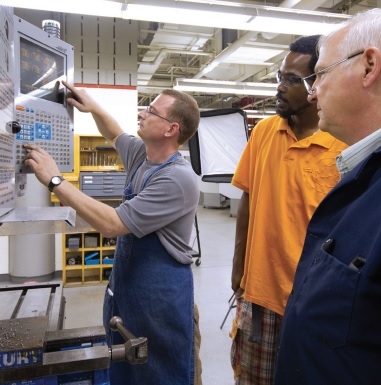You have /5 articles left.
Sign up for a free account or log in.

Job training at Grand Rapids Community College
Grand Rapids Community College
Companies teaming up with local colleges and universities to develop employee training programs isn't new. But a program in Michigan has found success with an unusual way to fund these programs.
The Michigan New Jobs Training Program works as a two-way pipeline between the state's community colleges and local industries. Businesses looking for a well-trained workforce contract with the colleges to provide training for their newly hired employees. The colleges are then paid by diverting state income tax withholdings from the employees into a fund that reimburses the institutions.
The program, inspired by a similar initiative that took off in the 1980s in Iowa, was established during the height of the recession in Michigan. A similar program also exists in Kansas. Michigan's program was due to expire in 2018, but was recently renewed and extended through 2023.
"One thing about this model and the structuring between Iowa, Kansas and Michigan is that it's all exclusively with the community colleges," said Dan Phelan, president of Jackson Community College, who brought the idea to Michigan. "It's the recognition that the community college really does own this space between career and workforce development."
The state lost more than half of its manufacturing jobs in a 10-year period, so politicians on both sides of the aisle were looking for ways to stimulate job creation in 2008, when the program was created.
The community colleges are authorized to capture the income tax withholding associated with the new employee's wages and to use that pot of money to train the new employees. The jobs also have to be "net new" to the employer, meaning they must be new hires or employees who have been laid off and are now in new positions, said Adriana Phelan, vice president of the Michigan Community College Association (and who is married to Jackson Community College President Dan Phelan).
Those new jobs also have to pay 175 percent of the state's minimum wage. Michigan legislators recently reformed the minimum-wage laws so that the wage is on a schedule to increase every year. As of today, the state's minimum wage is set at $8.15 an hour, so under the program, these new jobs have to pay at least $14.26 an hour, Adriana Phelan said.
An independent report from Anderson Economic Group found that in 2012, the colleges received $2.9 million in income tax revenue to cover the cost of the training. But the policy's net economic impact in the state was more than $76 million in additional earnings and 2,266 new jobs.
The community colleges work with their employer partners to develop the contract's terms and the type of specialized training employees receive.
Because Michigan is the only state in the country without a centralized higher education office or coordinating board, that means its community colleges are completely autonomous in the type of programs they offer, especially to the companies that are interested in partnering with them for specific workforce training. That training can range from offering associate degrees to certifications or specialized training, Adriana Phelan said.
Some of the new employees may already be enrolled as students at the college, or they may be recruited as new employees outside of the college by the employer, said Steve Ender, president of Grand Rapids Community College.
Grand Rapids was the first of Michigan's 28 two-year public institutions to sign an agreement with a business under the training program. But it took a different route to receiving funding for the program.
"Many of the colleges front the training, which is usually paid by the diversion of [state income tax dollars]. … We don't," Ender said. Instead, the employers sign a revenue bond to cover the cost of the training and the payroll taxes are paid back to the employers. "It left us in a safer place."
Each agreement varies from industry to industry and company to company. Some colleges may offer a traditional apprenticeship model or more customized training for accounting, robotics or manufacturing jobs.
Grand Rapids, for instance has 11 different agreements with employers in Western Michigan that have produced nearly 5,000 new jobs.
Macomb Community College, in the southeastern part of the state, is one of the newer colleges to sign on to the program, with three companies soliciting training. Like Grand Rapids, Macomb also requires the employer to pay the college up front. Most of their programs are tied into the college's 16-week semesters and offer credit.
"Even though we have a deep portfolio of content and training subjects we can offer up to employers, there are still cases where they talk about a need we don't have a predeveloped, existing program for, so we'll create it ourselves," said Dave Corba, dean of business and information technology at Macomb. "We have in-house folks who are instruction designers and outside consultants who we engage with on different subjects. One way or another we'll figure out a way to develop the appropriate training program."
In total, more than 100 employers participate, holding partnerships with 18 of the state's community colleges. The program has created nearly 13,400 new jobs, according to the MCCA.
A cap limits the number of colleges and employers that can participate, ensuring that contracts don't exceed $50 million until an existing contract is paid off or paid down. But the colleges are working to convince the Legislature to eliminate that cap.








